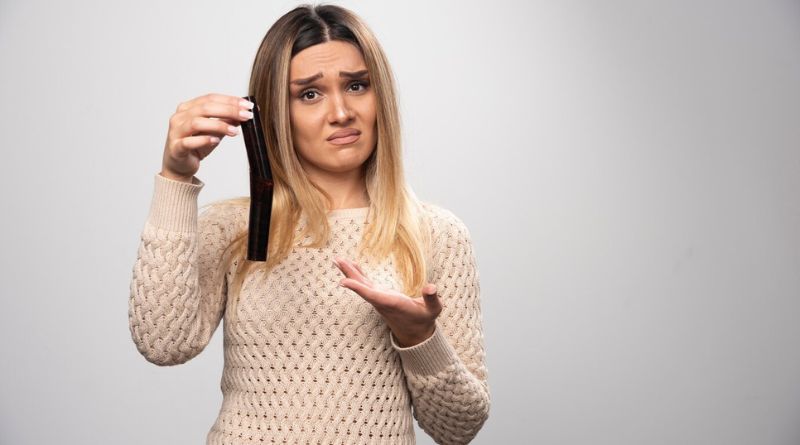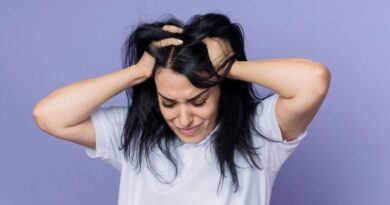Which Vitamin Deficiency Causes Hair Loss – Vitamins are essential for many processes in your body, and a deficiency in one can lead to a number of different effects. Vitamin A is important for skin health, nail strength, and vision. Vitamin B (Biotin) helps with hair growth and skin health. Find out more about how vitamins affect the look and feel of your hair and Which Vitamin Deficiency Causes Hair Loss in this blog post!
Vitamin D is a vital component for human health and is found in abundance in the sun. It improves immunity, helps to maintain bones and skin healthy, stimulates cell growth, and aids in the growth of new hair follicles, among other things. It is mostly through sun exposure that vitamin D is absorbed, but it is also possible to increase your vitamin D intake by taking dietary supplements and eating certain foods.
When your body does not receive the necessary quantity of vitamin D, it can manifest itself in a variety of ways, including hair loss. Alopecia areata, often known as spot baldness, and a variety of other health disorders have been related to a vitamin D deficit in the past. Source that can be trusted. Bone softening, low bone density, osteoarthritis, heart disease, and cancer are just a few of the conditions that might occur.
What is hair loss?
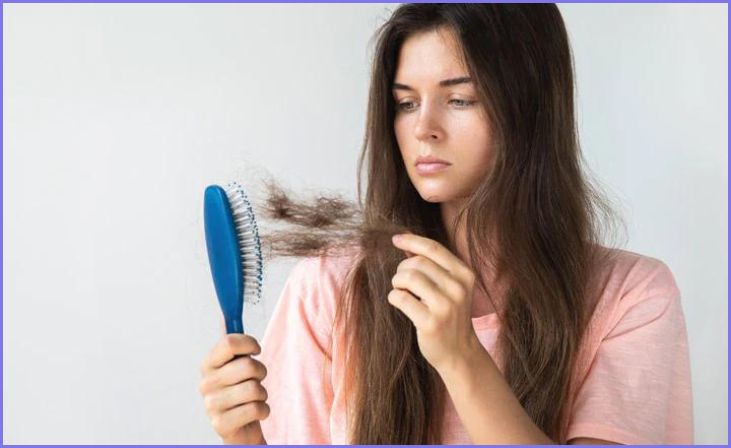
Hair loss is the partial or complete loss of hair from the scalp. It can result in either temporary baldness, or it can be a long-term problem. Hair loss may be classified as androgenic (male-pattern baldness), telogen effluvium (shedding), alopecia areata (patchy hair loss), and cicatricial (scarring). There are many reasons why someone might experience hair loss. The most common cause is alopecia areata, an autoimmune disease that results in hair follicles being destroyed by the body’s own immune system. Other causes can include chemotherapy, autoimmune diseases, vitamin deficiencies, over exposure to the sun or chemicals, and stress.
Also, Read – Can Bed Bugs Live In Your Hair
Types of hair loss
There are many types of hair loss. The most common type of hair loss is alopecia, which is an autoimmune disease that causes the immune system to attack the body’s cells. Alopecia can be inherited or caused by lifestyle choices or health conditions. Other types of hair loss are telogen effluvium, which is caused by a medical condition or certain medications, and erythrytica areata, which is an autoimmune disorder.
Is it true that a vitamin D shortage causes hair loss?
According to research from a reputable source, a deficiency in vitamin D in the body might result in hair loss. One of the functions of vitamin D is to stimulate both new and old hair follicles. It is possible that fresh hair development will be inhibited if your body does not receive enough vitamin D.
Alopecia areata, an autoimmune disorder that develops bald patches on the scalp and other parts of the body, has been related to vitamin D deficiency in recent years. Alopecia is a hair loss condition that can affect both men and women. Another study conducted by Trusted Source discovered that women between the ages of 18 and 45 who suffered from alopecia or other types of hair loss had low vitamin D levels.
Inadequate vitamin D levels can be caused by a variety of factors, including spending too much time inside, excessive sunscreen use, and a diet deficient in vitamin D-rich foods.
Preventing and treating hair loss as well as vitamin deficiency
People who believe they have hair loss as a result of a vitamin deficit should seek professional help rather than self-diagnosing. In addition to testing for vitamin deficiencies and making dietary and supplement suggestions, a doctor may also suggest further therapy options to patients. As mentioned above, it is possible to have many types of hair loss at the same time, thus it is critical to have a correct diagnosis.
Also, Read – Hair Texturizer
What is the effect of vitamin D on hair?
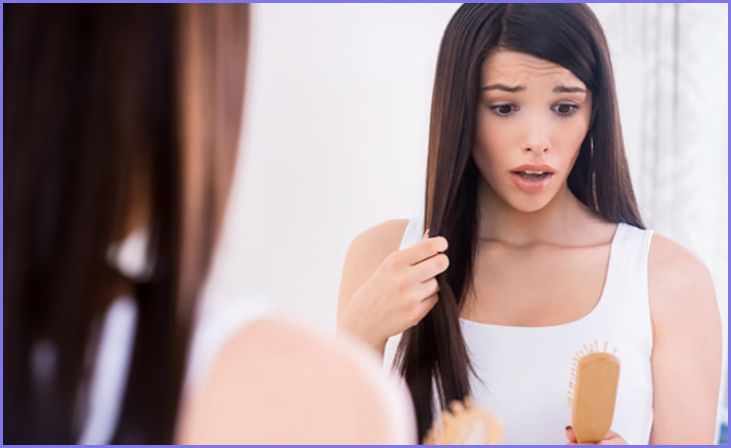
Vitamin D has an impact on the health of many different regions of the body, including the skin and hair, among others.
When it comes to the growth of new hair follicles, Vitamin D is important. Hair follicles are the microscopic pores via which new hairs are produced. New follicles may aid in the preservation of hair thickness and the prevention of premature hair loss in existing hair.
Because of this connection, getting appropriate amounts of vitamin D can help to promote hair growth and regrowth in both men and women.
Prevention
People’s first line of defence against hair loss caused by a vitamin D shortage is to spend 15 to 20 minutes per day outside and consume foods that are high in vitamin D, according to WebMD.
A person may also wish to incorporate a vitamin D supplement into their daily routine in order to achieve their vitamin D intake objectives.
Brittle or sparse hair necessitates delicate treatment, therefore anyone suffering from hair loss can prevent additional breaking by performing the following:
keeping the hair from being pulled when brushing avoiding ponytails and other restrictive hairstyles
making use of a gentle and natural hair product
Putting long hair in a loose braid before bed to keep it from tangling is a good idea.
The three most common causes of hair loss
The three most common causes of hair loss are male pattern baldness, female pattern baldness, and alopecia areata (an autoimmune disease). Sometimes, the cause is unknown. Hair loss can be caused by stress or some underlying medical problem.
How to get your hair back to its original state
Hair loss can be a very difficult process to get through. When you lose your hair, you’re not only losing an important part of your physical appearance but also a part of who you are on the inside. There are many ways for people experiencing hair loss to regain their locks. One way is to take biotin supplements, which can help promote natural hair growth and prevent future hair loss.
Also, Read – Is mane and tail good for your hair
Importance of Vitamins for the Body
Vitamins are crucial for the body to function. They provide our cells with energy, help us maintain healthy skin and repair cells, and keep us feeling good overall. Vitamins are also important for the production of hormones, which in turn regulate some of the functions of our bodies. A deficiency in one vitamin can lead to some major problems in some areas of the body, including hair loss.
How to Get a Balanced Diet

A diet that includes a wide variety of foods is the best way to ensure hair health. If you eat too much of certain things, they can lead to vitamin deficiencies, which may cause hair loss. To avoid this, try to maintain a healthy and balanced diet.
What are the normal hair growth cycles?
The normal hair growth cycle consists of three phases: the anagen phase, catagen phase, and telogen phase. In order for a person to progress from one phase to the next, the old follicle must be shed.
What are the reasons for hair loss?
Millions of people experience hair loss every day and it’s not just a cosmetic issue. It can be caused by many different things such as stress, hormones, thyroid dysfunction, and vitamin deficiencies. The most common vitamin deficiency that causes hair loss is iron deficiency. This can prevent the growth of new follicles and can also lead to telogen effluvium- a sudden and permanent shedding of all hairs on your head.
Can hair transplants cure hair loss?
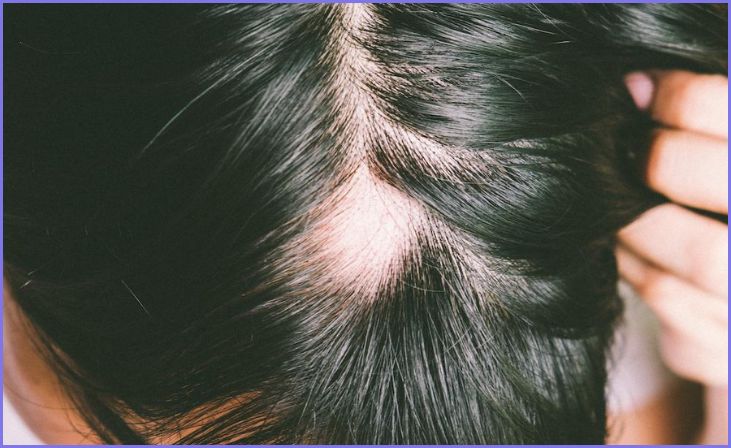
The answer to this question is a definitive “maybe”. Hair transplants can’t cure hair loss, but they can help it. Many people with hair loss problems often get a hair transplant to camouflage the problem and reduce the amount of stress and embarrassment caused by the condition. By distributing their existing hair to bald or thinning areas, they get natural-looking results that allow them to live a normal life.
Conclusion (Which Vitamin Deficiency Causes Hair Loss)
Vitamin D deficiency is linked to hair loss. Insufficient levels of this crucial vitamin can disrupt hair follicle cycling, leading to increased shedding and decreased hair density. Adequate vitamin D intake is essential for maintaining healthy hair growth, making it a key factor in preventing hair loss.
FAQs
Vitamin D is crucial for maintaining healthy hair growth, and its deficiency can lead to increased shedding.
Adequate vitamin D intake is essential for overall health, including hair health. Consult a healthcare professional for personalized advice.
Fatty fish, fortified dairy products, egg yolks, and exposure to sunlight are good sources of vitamin D.

